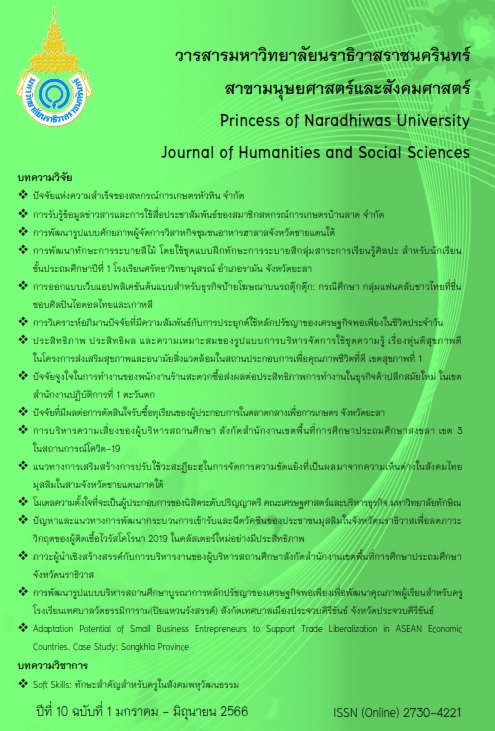Soft Skills: Important Skills for Teachers in Multicultural Society
Main Article Content
Abstract
Teachers play an important role in the development of students' learning and in motivating them to achieve academic, professional, personal, and social success. Soft skills, which are a set of intra-personal and interpersonal skills related to abilities, behaviors, and attitudes that help teachers adapt working with others and adjust themselves with surroundings. Soft skills can also promote the development of other skills, such as academic, technical, and professional skills. In particular, teachers working in multicultural society must have broader vision, positive attitude and recognize cultural diversity in classroom. Teachers should be familiar with a diverse classroom and enhance students working together in harmony in the diverse classroom. As a result, soft skills are similar to a career supporter for teachers who know students, admire diversity, and are aware of the dynamic link between the things surrounding the learner. This article aimed to present soft skills-related issues in order to create more understanding of these skills, comprising of 3 dimensions: Teacher competencies in multicultural society, Soft skills for teachers affecting learners and Soft skills development for teachers in multicultural society. These guidelines will be an important mechanism in promoting the development of teachers to be truly successful in life and work.
Article Details

This work is licensed under a Creative Commons Attribution-NonCommercial-NoDerivatives 4.0 International License.
References
ชรินทร์ มั่งคั่ง. (2562). การรู้พหุวัฒนธรรมศึกษาและการปฏิบัติเชิงวิชาชีพของครูสังคมศึกษาในโรงเรียน
มัธยมศึกษา. วารสารศึกษาศาสตร์ มหาวิทยาลัยมหาสารคาม, 13(1), 79-90.
ฐาปกรณ์ อ่วมสถิตย์. (2564). การพัฒนาทักษะซอฟต์สกิลด้วยการดำเนินโครงการจิตอาสา ตามแนวทาง
จิตตปัญญาศึกษา. วารสารศิลปศาสตร์ราชมงคลสุวรรณภูมิ, 3(1), 37-50.
ฐิติกาญจน์ บุญรักษา อินทาปัจ, และอรัญญา ตุ้ยคำภรี. (2560). สมรรถนะทางพหุวัฒนธรรมในการ
ปรึกษาเชิงจิตวิทยา. วารสารจิตวิทยา มหาวิทยาลัยเกษมบัณฑิต, 7(2), 45-65.
นัตยา หล้าทูนรีนกุล. (2561). ครบเครื่อง เรื่อง PLC ให้มีนัวตกรรมในยุค Thailand 4.0 .สำนักงานเขตพื้นที่
การศึกษาประถมศึกษาขอนแก่น.
มณฑิรา อั้งน้อย, รัชชุกาญจน์ ทองถาวร, และไพบูลย์ อุปันโน. (2563). การพัฒนาจิตรู้เคารพของเด็ก
ปฐมวัยในบริบทพหุวัฒนธรรม. วารสารศึกษาศาสตร์ มหาวิทยาลัยนเรศวร, 22(3), 177-190.
วิจารณ์ พานิช. (2558). วิถีสร้างการเรียนรู้เพื่อศิษย์ ในศตวรรษที่ 21. วารสารนวัตกรรมการเรียนรู้, 1(2), 1-12.
ศรีมณา เกษสาคร. (2554). การพัฒนารูปแบบการพัฒนาภาวะผู้นำพหุวัฒนธรรมของหัวหน้าสาขาวิชาภาษาอังกฤษ ในมหาวิทยาลัยเอกชน (วิทยานิพนธ์ปริญญามหาบัณฑิต). จุฬาลงกรณ์มหาวิทยาลัย, กรุงเทพฯ.
สำนักงานราชบัณฑิตยสภา. (2557). จรณทักษะ. สืบค้นจาก http://legacy.orst.go.th/?knowledges
สิทธิชัย ทองมาก, วุฒิชัย เนียมเทศ, เรชา ชูสุวรรณ, และฤทัยชนนี สิทธิชัย, (2561). เหลียวหลังแลหน้า
คุณภาพการศึกษาในสามจังหวัดชายแดนภาคใต้. วารสารมหาวิทยาลัยนราธิวาสราชนครินทร์
สาขามนุษย์ศาสตร์และสังคมศาสตร์, 5(ฉบับพิเศษ), 186-198.
ไหมไทย ไชยพันธุ์. (2562). การพัฒนาพฤติกรรมมนุษย์. สำนักพิมจุฬาลงกรณ์มหาวิทยาลัย.
Almeida, S. C., Moore, D., & Barnes, M. (2018). Teacher identities as key to environmental education for
sustainability implementation: A study from Australia. Australian Journal of Environmental
Education, 34(3), 228-243.
Anderson, B. M. (2020). The Most In-Demand Hard and Soft Skills of 2020. Retrieved from https://www. lInkedin.com/business/talent/blog/talent-strategy/linkedin-most-indemand-hard-and-soft-skills
Baharudin, D. F. (2012). Perception and understanding of counselor trainees on multicultural counseling in
Malaysia. Proceedings of Asia Pacific RIM International Counseling Conference. Hong Kong.
Capella University. (2018). 6 Essential Soft Skills for K-12 Teachers. Retrieved from https://www.capella.edu/ blogs/cublog/essential-soft-skills-for-k-12-teachers/
Cimatti, B. (2016). Definition, Development, Assessment of Soft Skills and Their Role for the Quality of
Organizations and Enterprises. International Journal for Quality Research, 10(1), 97-130.
Crawford, A., Weber, M. R., & Lee, J. (2020). Using a grounded theory approach to understand the
process of teaching soft skills on the job so to apply it in the hospitality classroom. Journal of
Hospitality, Leisure, Sport & Tourism Education, 26(1), 100239.
Gruzdev, M. V., Kuznetsova, I. V., Tarkhanova, I. Yu. & Kazakova, E. I. (2018). University Graduates’ Soft
Skills: The Employers’ Opinion. European Journal of Contemporary Education, 7(4), 690 - 698.
Huda SA, N., Suyanto., Arifi, A., Putranta, H., & Munir Azizah, A. N. (2021). Experiences of Participants in Teacher Professional Education on Obtaining Soft Skills: A Case Study in Indonesia European. Journal of E ducational Research, 10(1), 313 - 325.
Inspire Education. (2013). Professional Development – Hard And Soft Skills For Teachers. Retrieved from https://www.inspireeducation.net.au/blog/professional-development-hard-and-soft-skills-for-teache rs/
Jaladin, R. A. M., & Simmonds, J. G. (2011). Perceived multicultural counselling competence of professional
counsellors in Malaysia: A national 246 survey. Paper presented at the International Counseling
Conference, Bandung, Indonesia.
Mailool, J., Retnawati, H., Arifin, S., Kesuma, A. T., & Putranta, H. (2020). Lecturers' experiences in teaching
soft skills in the teacher profession education program (TPEP) in Indonesia. Problems of Education in
the 21st Century, 78(2), 215-234.
Majid, S., Liming, Z., Tong, S., & Raihana, S. (2019). Importance of Soft Skills for Education and Career
Success. International Journal for Cross-Disciplinary Subjects in Education (IJCDSE), 2(2), 1036-1042.
Malykhin, O., Aristova,N., Kalinina,L., & Opaliuk, T. (2021). Developing Soft Skills among Potential Employees:
A Theoretical Review on Best International Practices. Postmodern Openings. 12(2), 210-232.
Skill Builder Pro. (2018). Soft Skills: The Hard Skills for Today’s Workforce. Retrieved from https://mma.prnews wire.com/media/792186/Soft_Skills__The_Hard_Skills_for_Today_s_Work-force_Final.pdf?p=original.
Tien, H. L. S, & Wang, Y. C. (2016). Career counseling research and practice in Taiwan. The Career
Development Quarterly, 64, 231-243.


